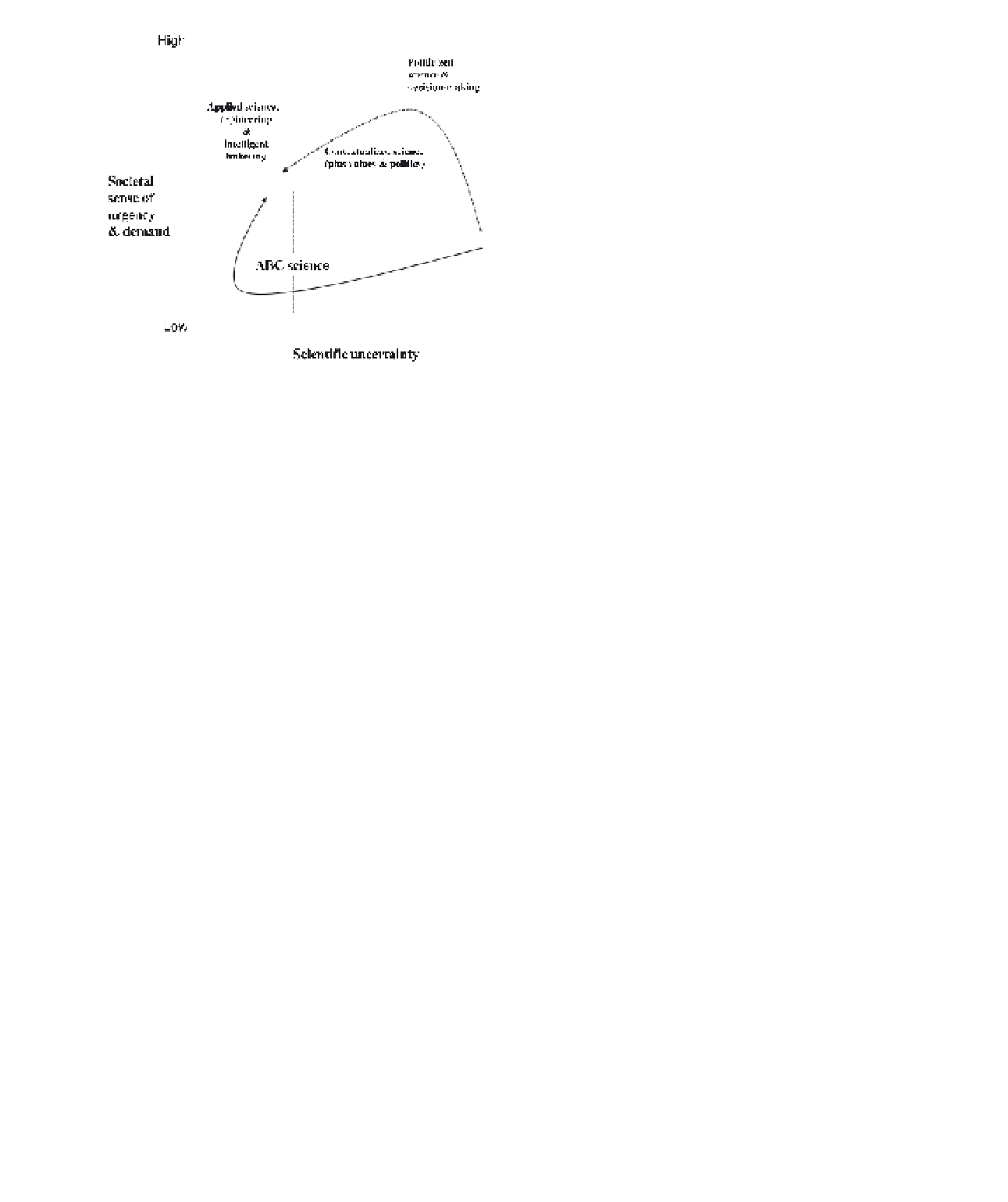Environmental Engineering Reference
In-Depth Information
ernmental agency or a nongovernmental organization
(NGO). We stress that these provisos are not meant to
protect any exclusive rights of the sponsor, but only to
make transparent to the public the context and con-
straints under which any given set of research fi ndings
has been reached. Not only is sound science required
if we are to move forward, but also sound ways of
interacting and communicating with all the actors and
stakeholders in the larger context, outside of academia.
This requires these amendments to the aforementioned
classical scientifi c ethos.
In the light of the issues raised by the Wadden Sea
controversy, Swart and van Andel (2008) proposed to
extend Merton's code of conduct for what they call
' contextualized research ' (see Figure 22.3 ). Their rec-
ommendations include (1) recognition of the potential
context of each research project and willingness to
conduct open and interactive communication, (2) con-
sideration of requirements of confi dentiality as an
exception, particularly in government-funded research,
(3) willingness to consider and discuss seriously com-
peting, including politically inspired, rationales for a
research project, (4) presentation of scientifi c results
and interpretations in publicly accessible texts, with
the proviso that the scientifi c quality of the original
research should not be ' lost in translation ' , and (5)
stipulation of a scientifi c evaluation of the political
decisions following the presented research results in
the original contract, thus contributing to a transpar-
ent relationship between science and society.
Figure 22.3
Different modes of scientifi c research as a
function of societal interests and scientifi c uncertainty. The
solid arrow in the fi gure indicates the classic route of
autonomous science that is followed by applied science. The
dashed arrow is a schematic representation of the route of
research projects involved in the cockle fi shery controversy
which became strongly societally contextualized and
skewed, in both directions, by political bias. ABC,
autonomous, basic and curiosity driven research. (Modifi ed
from Swart & van Andel 2008 .)
for openness and public exchange of results and
insights;
2.
Universalism: the pursuit of universal truth, which
implies that scientifi c statements should be based on
objective observations and consistency in logical dis-
course, thereby avoiding insofar as possible individual
and subjective prejudices or preferences, be they politi-
cal, racial, cultural or gender-related;
3.
Independence or freedom from ideology or com-
mercial interests imposed or suggested by a fi nancial
sponsor that might infl uence the conduct of research
or the interpretation of results; and, fi nally,
4.
Scepticism, implying a critical attitude towards sci-
entifi c claims, results and interpretations in published
papers, including those by the researcher himself or
herself.
Based on their analysis of the long-term controversy
on the shellfi sh exploitation in the Dutch Wadden Sea
(Box 22.1), Swart and van Andel (2008) concluded
that codes of conduct like Merton's need a number of
provisos, or footnotes, in the case of sponsored scien-
tifi c projects aiming at application in practice, whether
they be initiated and paid for by a corporation, a gov-
Interdisciplinary c ooperation
In the case mentioned in Box 22.1, neither economists
nor social scientists were involved in the EVA study
group, which consisted of ecologists only. Economists
calculated the budgets related to the shell fi sheries, but
they did not form part of EVA, and their reports
remained informal. Yet this kind of case obviously calls
for the high level of the kind of interdisciplinary
approach we have described in earlier chapters.
As mentioned, in Chapter 2 and in section 22.2.1,
the interdisciplinary fi eld of ' ecological economics ' has
fi nally emerged, after a long period of tentative com-
munication and miscommunication between ecolo-
gists and economists. Both disciplines have much in
common, including a quantitative orientation in
methodology, and an interest in scarce resources and
in holistic approaches to cost-benefi t analyses. Fur-
thermore, as Hardin (1991) noted, economics is quite













